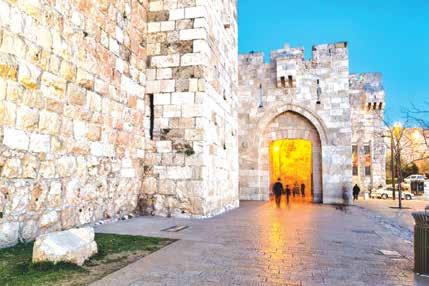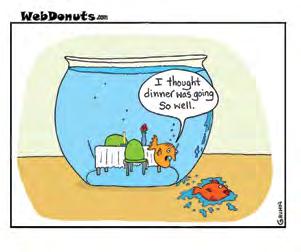
4 minute read
Delving into the Daf
Sensitive Situations
By Rabbi Avrohom Sebrow
The survival of the donkey would be too great a blow to Bilam’s dignity.
The Gemara is replete with examples of the sensitivity we must have even to individuals who may have sinned. There is a list of aveiros for which one receives the punishment of tzaraas. The most famous cause of tzaraas is the sin of loshon hara. The metzora is sent out of all three manachanos. He is not allowed to enter Yerushalayim. The Gemara says that the area under the gates of Yerushalayim was specifically not sanctified to be considered part of Yerushalayim (Pesachim 85b). This is due to our compassion for the unfortunate metzora. He is left on the outskirts of Yerushalayim to face the brutal Middle Eastern sun or a torrential downpour. With few options available to him, he may find shelter in the gateway to Yerushalayim. This is due to the fact that the area of the gateway itself was specifically not sanctified for precisely this reason, to allow the metzora to find refuge there. We don’t say the metzora brought this punishment on himself and so we should let him suffer. Rather, we are deeply concerned for his wellbeing.
In fact, we find an even greater example of this in the Torah (Bamidbar 22). Bilam HaRasha was on his way to curse the Jewish nation; his goal was the total annihilation of the Jewish people. But Hashem sent an angel to obstruct Bilam’s path. While Bilam was not able to see the angel, his donkey saw him clearly. The donkey halted, and Bilam struck it repeatedly to coerce it to continue. The donkey miraculously spoke, rebuking Bilam for the beating. The donkey’s censure remained unanswered.
What a fine specimen this donkey would make for a public presentation! Throngs of people would come to see the ogre and his talking donkey. However, the world never got the chance: the donkey expired immediately following this episode. Rashi explains that the survival of the donkey would be too great a blow to Bilam’s dignity. People would point to the donkey and say, “This is the donkey that silenced Bilam.” Bilam obviously deserved severe retribution (and eventually received it). Nevertheless, Hashem judged that any additional embarrassment for Bilam was unwarranted at this point. This, despite Bilam’s being the personification of evil (see Derech Hashem). If that is the treatment afforded a wicked man, then how much more careful we must be with our conduct towards our friends and family to prevent their embarrassment!
The Gemara in Pesachim offers yet another example of our attitude towards someone who is being punished for their actions. Chazal were concerned that some individuals might not be careful with their korban Pesach. Their lackadaisical attitude may result in the korban becoming tamei and therefore inedible. Therefore, they decreed that anyone whose korban becomes tamei must burn their korban in the open in front of the Beis HaMikdosh. This would serve as a reasonable deterrent and punishment to prevent the Korban Pesach from becoming tamei due to inadvertence.
The Mishna states that anyone who has to burn their korban by the Beis Hamikdash can and must use consecrated wood that was set aside for use on the Mizbeach. The Gemara wonders why the individual can’t bring his own wood from home. Rav Yosef explains that not everyone will be able to afford the wood. This wood will be an unforeseen yom tov expense that the person hadn’t planned for. Therefore, a poor individual will have no choice but to use the Beis Hamikodash’s wood. Chazal decreed, therefore, that even a rich individual must use the Beis Hamikodash’s wood in order not to embarrass the person who can’t afford his own.
Burning the korban openly in front of everyone is certainly quite embarrassing. This burning process, which will take some time, will give the onlookers a chance to realize what occurred. Yet the Gemara considers a one-time quick delivery of consecrated wood to the poor person embarrassing enough to mandate that the Beis Hamikdash supply everyone who needs to burn their Pesach with wood. This, despite the fact that Chazal mandated that this individual be publicly shamed for allowing his korban to become tamei. However, that is not a reason to let him suffer even a little more embarrassment that he is not deserving of.
The Mishna in Bikkurim relates that poor people would bring bikkurim in wicker baskets, while rich people would bring bikkurim in gold and silver baskets. The Tosfos Yom Tov asks why didn’t the rabbis decree that everyone should bring bikkurim in wicker baskets in order not to embarrass the poor people who couldn’t afford the expensive baskets? The Tosfos Yom Tov answers that, in truth, this would ordinarily be the proper course of action. However, in this case, this would diminish the honor of the Beis Hamikdash. Even when it comes to performing a mitzvah in a beautiful manner such as the bringing of bikkurim, we would prefer to mandate that everyone use a cheap basket. However, for the honor of the Beis Hamikdash, we didn’t make such a decree.
This is another example of the lengths we must go not to embarrass someone. We would even forgo Zeh Keli v’anvehu – hiddur mitzvah – not to embarrass someone who couldn’t afford to participate in that hiddur mitzvah.
Rabbi Avrohom Sebrow is a rebbe at Yeshiva Ateres Shimon in Far Rockaway. In addition, Rabbi Sebrow leads a daf yomi chaburah at Eitz Chayim of Dogwood Park in West Hempstead, NY. He can be contacted at ASebrow@gmail.com.











